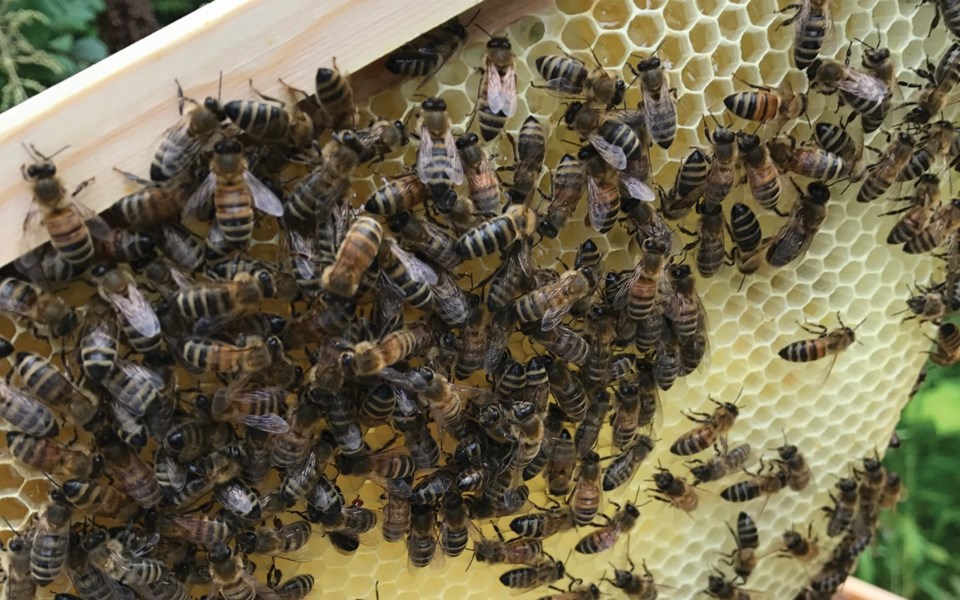The first time Isabel Chung was stung by a bee, she was helping her boss, the executive chef at the Fairmont Olympic Hotel in Seattle and an avid beekeeper, move some hives. There was quite a bit of swelling that first round. But by the third time she was stung, she couldn't move her fingers on one hand nor could she swallow.
That's when you pretty much know you have a problem.
It takes a certain kind of beekeeper to keep bees even when she knows she can end up in the emergency room with anaphylaxis from a single sting. So hats off (that's our collective beekeepers' hats and veils off) to Isabel.
Not only has she made waves, the right kind of waves, in her first couple of years as the executive chef running the six kitchens at Fairmont Chateau Whistler (she's the only women working as executive chefs in the Fairmont chain worldwide), Isabel also keeps something vital to us all and especially dear to my heart on the deck of her and hubby Fraser Carey's master bedroom: Bees.
Yes, folks. Despite the fact that scientists, concerned citizens, environmental activists and the likes of scribes like me have been studying it and advocating about it for years, the bells, alarm and otherwise, still have not pierced the thick skulls of some lurking in seats of power. Sadly, scarily, depressingly, bees are still in trouble.
From colony collapse and climate change, to the outrageous stubbornness with which Canada is still clinging to neonicotinoids, or neonics for short—pesticides proven in more than 1,500 scientific studies to be so poisonous to bees and other pollinators that the EU has banned them outright (read all about them in this column: Pique, July 3, 2014)—bees need every helping hand we can give them. That's why I love people like Isabel.
To start, ask her why bees are so important to our food supply and she nails it in a nutshell (ahem).
"There are so many things in the produce aisle that you will no longer see if bees go away," she says.
"Some of my very favourite things and a good percentage of things like blueberries, raspberries and hazelnuts, even, that are important B.C. crops—are really bee-pollinated. Cherries for one—90 per cent of the cherry market would go away if bees are gone. And California will have a full meltdown if bees go away." That includes almonds, which are 100 per cent dependent on natural pollination.
Experts worldwide estimate that about 90 per cent of flowering plants, including cherries and all tree fruits, need pollinators like bees to reproduce. About 75 per cent of food crops depend at least in part on pollinators.
But according to a 2016 UN report, two out of five bees and other invertebrate pollinators are threatened by extinction.
Last year, the American Association for the Advancement of Science—the largest scientific academy in the world—mapped wild bee populations across the U.S. and discovered that wild bee populations are at risk in 139 counties in key agricultural areas. These include California, where so much of the fresh produce we depend on grows, as well as the Pacific Northwest, west Texas and beyond. Wild bee colonies in the study saw nearly a 25 per cent population decline from 2008 to 2013 primarily due to changes in land use, intensive agricultural practices and pesticide use, alien invasive species, diseases and pests, and climate change.
I was raised on the prairies and I don't scare easily. But all this scares the hell out of me.
"It scares me, too," says Isabel, "because I think about how two generations from now, they might not ever know the produce we have today."
Enter the beehives on Isabel's deck, which she has learned how to maintain, how to clean, how to harvest and, most important, how to be fair to the bees (they never take all the honey).
But first I should point out that not only does Isabel keep her own bees. The Fairmont Chateau has been keeping bees of its own, starting with four hives and some 150,000 bees in 2013. (Isabel explains that while it's tough to assign population numbers per hive, given how much the population can fluctuate, most use the number of 50,000 bees per hive.) That's now expanded to 12 hives managed by Goldstrike Honeybees in Lillooet. The delicious honey, which largely comes from mountain wildflowers, is used in the Chateau's kitchens plus you can buy a jar in the hotel gift store.
Isabel and hubby Fraser, always on standby with a handy epi pen even though Isabel is now getting allergy therapy, have two hives. One is a conventional wooden hive, the other a flow hive from Australia where you simply turn a key and the honey flows out without opening up the hive—something indicative of her whole approach to bees.
Besides trying to go as naturally as they possibly can, like avoiding heavy chemicals, Isabel doesn't open her hives every day.
"I don't want to interfere with them," she says.
"I want them to do their thing, and I just want to provide whatever support they need to make that happen."
* * *
If you would like to provide whatever support you can to bees, you can learn about beekeeping from Pemberton's own beekeepers. A good place to start is Bubbees Farm, which has been raising honeybees for years. To urge Canada's policymakers to follow the lead of the EU and fully ban poisonous neonics that kill bees, sign this petition sponsored by the David Suzuki Foundation: davidsuzuki.org/action/canada-must-ban-neonics-now/
Glenda Bartosh is an award-winning journalist who finds it amazing that honeybees have been proven to understand the concept of zero.




